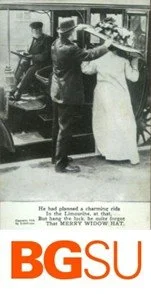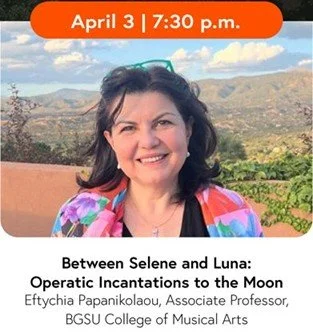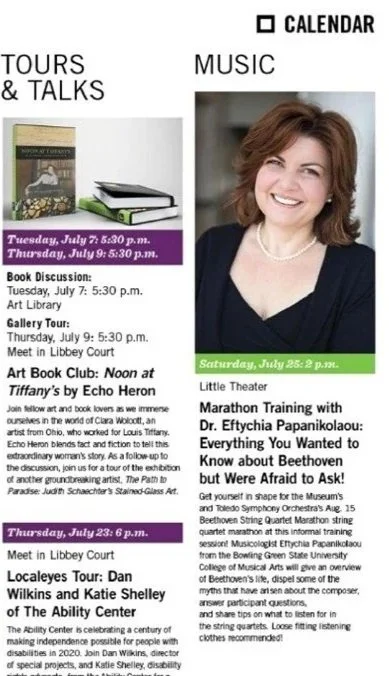Pre-Concert Talks
Pre-performance talks for the Toledo Opera, 2015-present
Four to six annual 30-minute pre-performance talks.
2015: Lucia di Lammermoor, Madama Butterfly
2016: Porgy and Bess, Roméo et Juliette, Il barbiere di Siviglia
2017: Le nozze di Figaro, Vanessa, Les pêcheurs de perles, Rigoletto
2018: I Dream, Die Zauberflöte
2019: Carmen, The Ballad of Baby Doe, Macbeth
2020: La bohème, Scalia/Ginsburg [cancelled due to the pandemic]
2021: Il Trovatore
2022: La traviata, Suor Angelica and Cavalleria rusticana
2023: The Merry Widow, La Cenerentola (Rossini)
2024: Roméo et Juliette (Gounod), Ragtime, Tosca
“Schubert’s Winterreise”
Pre-performance introduction, Christopher Scholl, tenor, Kevin Bylsma, piano.
Faculty Artist Series, College of Musical Arts, 9 October 2019
Music Marathon | “The Fanny and Felix Festival: A Musical Portrait of the Mendelssohns”
Introduction to chamber pieces performed by members of the Toledo Symphony Orchestra during the 2018 Music Marathon at the Toledo Museum of Art.
Co-sponsored by the TMA and the TSO.
GlasSalon at the Toledo Museum of Art, 11 August 2018
“Mahler and Das Lied von der Erde”
Pre-concert talk; version for chamber orchestra of Das Lied von der Erde, conducted by Maria Mercedes Diaz Garcia.
College of Musical Arts, Kobacker Hall, 19 April 2017
Pre-performance talk for an all-Tchaikovsky concert
Performed by BGSU’s Philharmonia Orchestra, with soloist Noah Bendix-Balgley, concertmaster of the Berlin Philharmonic.
College of Musical Arts, Bryan Recital Hall, 14 November 2016
Pre-concert talks for performances of Messiaen’s Quatuor pour la fin du temps, Brahms’s Deutsche Volkslieder, WoO 33, and Schumann’s Dichterliebe.
Special Guest at Evmelia IV Music Festival, Agria, Greece, March-April 2015
Bowling Green State University
Festival Series, 2009-2014
Pre-concert presentations for over 12 performances, by guest artists that included Anderson and Roe, Robert Levin, Chanticleer, Jeremy Denk, the Jerusalem Symphony Orchestra, Turtle Island Quartet, Christopher O’Reily, The New York Voices.
New Music Ensemble,
Bowling Green State University
Pre-concert talk for a concert of the New Music Ensemble, conducted by John J. Pearse. Works by Giacinto Scelsi, Michael Quell, Michael Kasinger.
College of Musical Arts, Bryan Recital Hall, 6 March 2014
“‘Freunde das Leben ist Lebenswert’”
Pre-performance lecture for performances of The Merry Widow, directed by Ronald Shields.
Wolfe Center for the Arts, Bowling Green State University, March 2013
Chamber Music Cincinnati, Cincinnati Conservatory of Music, 2006-2009
Pre-concert presentations for over 15 performances,
by guest artists and ensembles that included the Juilliard Quartet, St. Lawrence Quartet, Miró Quartet, Daedalus Quartet (with Awadagin Pratt, piano), Pro Arte Quartet, Artemis Quartet, Trio con Brio Copenhagen, and more.
“Verdi’s Legacy, A Hundred Years Later”
Pre-concert lecture for ‘SeptemberFest’ at Longy, celebrating Giuseppe Verdi’s Centennial.
Longy School of Music, Cambridge, Massachusetts, September 2001
Podcasts
Opera out of the Box: “Shabby Little Shocker”
Guest on the radio podcast of the Toledo Opera, hosted by Brad Cresswell; with Douglas Forsyth and Jane Sylvester. WGTE Public Radio, Toledo, September 2024.
https://www.wgte.org/radio/local-podcasts/opera-out-of-the-box/shabby-little-shocker
Opera out of the Box: “Viva la diva!”
Guest on the radio podcast of the Toledo Opera, hosted by Brad Cresswell; with Kevin Bylsma and Lindsey Anderson. WGTE Public Radio, Toledo, September 2024.
https://www.wgte.org/radio/local-podcasts/opera-out-of-the-box/viva-la-diva
Toledo SymphonyLab: “Mahler Mania”
Guest on the radio podcast of the Toledo Symphony Orchestra, hosted by Brad Cresswell; Mahler’s Third Symphony, with Zak Vassar and Alain Troudel; WGTE Public Radio, Toledo, June 2023.
https://www.wgte.org/radio/local-podcasts/toledo-symphonylabtm/mahler-mania
Toledo SymphonyLab: “Mahler Alive!”
Guest on the radio podcast of the Toledo Symphony Orchestra, hosted by Brad Cresswell; Mahler’s Fifth Symphony, with Zak Vassar, Alain Troudel, and Merwin Siu; WGTE Public Radio, Toledo, September 2019.
https://www.wgte.org/radio/local-podcasts/toledo-symphonylabtm/mahler-alive
Toledo SymphonyLab: “Mahler’s Resurrection”
Guest on the radio podcast of the Toledo Symphony Orchestra, hosted by Brad Cresswell; Mahler’s Second Symphony, with Zak Vassar and Merwin Siu; WGTE Public Radio, Toledo, May 2019.
https://www.wgte.org/radio/local-podcasts/toledo-symphonylabtm/mahlers-resurrection
Toledo SymphonyLab: “The Muse”
Guest on the radio podcast of the Toledo Symphony Orchestra, hosted by Brad Cresswell; discussion on music by Clara Schumann, Robert Schumann, and Johannes Brahms; with Zak Vassar and Merwin Siu; WGTE Public Radio, Toledo, February 2019.
https://www.wgte.org/radio/local-podcasts/toledo-symphonylabtm/the-muse
Festival, Museum, Community Presentations (Invited)
“Between Selene and Luna: Operatic Incantations to the Moon”
Bowling Green State University Planetarium, The Moon Speaker Series, 3 April 2025
Music from the Western art tradition (what we commonly call “classical”) has often relied on moon imagery to express and enhance its auditory potential—take, for instance, Beethoven’s Moonlight Sonata, or Debussy’s Clair de lune. Predictably, the moon occupies a special place in opera: it has been a symbol of moonstruck lovers; the source and reference of women’s “lunacy”; and it has inspired a plethora of prayers, songs, and incantations for guidance, support, solace, and reconciliation.
In this multimedia presentation we will experience how the moon has been depicted by composers, librettists, singers and stage directors, who for centuries have waxed—and waned—poetic about that “divine goddess” of the firmament.
“Wagner’s Flying Dutchman”
Led a 3-hour seminar for a group of 12 participants, ahead of the performance of the new production of Wagner’s The Flying Dutchman at the Santa Fe Opera, directed by David Alden and conducted by Thomas Guggeis.
Santa Fe Opera, New Mexico, August 2023
“Hieratic Iconoclasm: Liszt, Hanslick, and the Graner Festmesse”
Faculty Scholar Series, College of Musical Arts, Bowling Green State University; 5 October 2022
“Early Recording Technologies: It’s Amazing What You Hear!”
Virtual lecture presented under “ElderCollege Courses Spring 2022” at BGSU-Firelands, Ohio; 8 April 2022
“Beethoven Open Forum:
Everything you wanted to know about Beethoven but were afraid to ask!”
Open forum and discussion on Beethoven and his music, in advance of the 2020 Beethoven String Quartet Marathon at the Toledo Museum of Art,
July 2020 [cancelled due to the pandemic]
“One hundred years after the passage of the 19th Amendment”
Curated list of works written by women composers, and on-air conversation with Brad Cresswell.
WGTE Public Media, Toledo’s NPR station, 6 July 2020.
“Adapting Shakespeare’s Macbeth to the Operatic Stage”
On-air conversation about the genesis of Verdi's Macbeth, part of the Toledo Opera’s “Macbeth Day.” With Kevin Bylsma, hosted by Brad Cresswell, broadcast live on WGTE, Toledo's NPR station.
Sylvania Library, Ohio, 25 September 2019
“Of Holograms, Virtuosos, and Maria Callas”
Invited two-hour-long presentation on Maria Callas and the Hologram Tour, for “Music 102: De-composed,” a series of summer lectures offered by the Toledo Symphony Orchestra. Toledo, 15 July 2019
“What did Wagner learn about Greece from Nietzsche?”
Invited presentation at the Third International Festival of Contemporary Greek Music, “Ancient Greece as Source of Inspiration.”
Chios, Greece, July 2019
“Of Holograms, Wolves and Ducks: Eclectic Soundscapes in Blade Runner 2049”
Faculty Scholars Series, College of Musical Arts, Bowling Green State University; 24 October 2018
"Three Women Composers of the Nineteenth Century"
Invited two-hour-long presentation on Fanny Mendelssohn, Clara Schumann and Alma Mahler for “Music 102: De-composed,” a series of summer lectures offered by the Toledo Symphony Orchestra.
Toledo, 9 July 2018
“The Pearl Fishers at the Toledo Opera: Behind the Scenes”
Short presentation and panel moderator on aspects of production of Bizet’s The Pearl Fishers.
Registry Bistro, Toledo, 10 October 2017
“When Music is Silent:
Listening to the Music of Ancient
Greece through its Pottery”
Lecture presented at the Toledo Museum of Art in conjunction with the Museum’s exhibit “The Berlin Painter: Athenian Pottery of the 5th Century BCE.”
Toledo Museum of Art, 16 September 2017
“Shakespeare in Love”
Guest presenter for Toledo Opera’s Tuesday Talks on Gounod’s Roméo et Juliette; with Matthew Wikander (University of Toledo), Sarah Jobin (TSO), and opera director Bernard Uzan.
Registry Bistro, Toledo, 5 April 2016
“What did the Ballerina Hear?
The Unheard Music of Degas’s Paintings”
Lecture presented at the Toledo Museum of Art
in conjunction with the Museum’s exhibit “Degas and the Dance.”
Toledo Museum of Art, 21 November 2015
“Remodeling the Liturgy:
Uwe Scholz’s Große Messe”
Lecture presented at the Symposium “Beethoven's Sacred Music in Context”
Yale Institute of Sacred Music
Yale University, May 2015
“Opera Goes to Hollywood”
Lecture for the Faculty Scholars Series at the College of Musical Arts, Bowling Green State University.
Wood County Public Library, April 2009
“Filling Spaces: Baroque Sound and Symbolism”
Guest lecture for the Institute for Learning in Retirement at Miami University.
Art Museum, Miami University
Oxford, Ohio, April 2003
“Perspectives on Opera,
that ‘Exotick and Irrational Entertainment’”
Wellesley College Alumnae Association
2002 Reunion Faculty Lecture
Wellesley College, Wellesley, Massachusetts, June 2002
Invited Web Content
“Verdi’s Macbeth: ‘The Opera without a Love Affair!’”
Web blog post for “Shakespeare & Beyond,” Folger Shakespeare Library, Washington, DC, October 2019
“‘L’opera senza amore!’ That was the Italians’ reaction to Verdi’s Macbeth when it premiered in Florence in 1847. Despite its immediate success and subsequent popularity, an opera that involved no great love affair struck audiences as an oddity. It was not as if Verdi was known for any blatantly amorous scenes in his operas—quite the contrary. But, without lovers who must go through hurdles to consummate their love, what would opera be like? There is a reason Charles Gounod in 1867 chose to concentrate on the two lovers in Roméo et Juliette and downplayed any aspect of politics from the original. After all, he gave us one of the best adapted endings when Juliet awakes for a few precious minutes in order to sing a sumptuous duet with Romeo before their inevitable death. And a year later, in 1868, French sensibility dictated that Ambroise Thomas needed to valorize Hamlet—few saw anything wrong with the character’s crowning as king at the end of the eponymous opera. As these examples show, bringing Shakespeare to the operatic stage often involved substantial adaptation. […]”
https://www.folger.edu/blogs/shakespeare-and-beyond/verdi-macbeth-shakespeare-opera/
“On Cavafy, Then and Now”
Essay invited by the C.P. Cavafy Chair at the University of Michigan to celebrate the 150 years of Cavafy’s birth. In C. P. Cavafy Forum, “Greek Diaspora Intellectuals on ‘the meaning of Cavafy today’”; curated by Vassilis Lambropoulos, Department of Modern Greek at the University of Michigan, April 2013
“[In college we] discovered the sensuous Cavafy, the clandestine poetry that our teachers had kept unseen. The entryway to what I like to call “the muted” Cavafy, might have been Manos Hadjidakis’s setting of “Days of 1903.” What robust musical language! We ended up memorizing not only the poetry but all the songs of his Magnus Eroticus record. Cavafy wrote about diaphanous erotic landscapes with an extraordinary linguistic boldness. His descriptions of sensual hedone transferred as synesthetic aromas onto our young souls; and his innate musicality fed our voracious minds with sensory and spiritual delight: “. . . those lips—I never found them again. […]
Today, more than ever, we yearn for Cavafy’s poetry. It teaches us the pleasure of solitude, in a world that screams for exposure; it promotes the fragility of pleasure in a world full of fake cacophony; and it elucidates a mythical world of grandeur and fall, at the same time robust and weak, familiar and alien, attractive and grotesque, much like our own. In our ever-changing world, Cavafy’s poetry embodies the melancholy of ruin as well as the promise of desire. Maybe we can exorcize some of today’s evil if we start to recite his poetry out loud again. ‘Δώδεκα και μισή. Πώς πέρασεν η ώρα. / Δώδεκα και μισή. Πώς πέρασαν τα χρόνια.’”
https://lsa.umich.edu/modgreek/window-to-greek-culture/c-p--cavafy-forum.html
Program Notes
1998-present
Published program notes written for a variety of vocal recitals, solo piano (and other instrumental) music.
1997-present
Program notes written for a variety of orchestral, chamber-music, and other ensembles.
Ellipsis Trio, Boston (2014-16)
Published program notes for 20+ works, including Dvořák, Ravel, Schubert, Shostakovich, Rachmaninoff, Arensky, Ives, Foote, Schubert, Haydn, Frank Martin, Beethoven, Brahms, Fauré.
ALEA III, contemporary music ensemble in residence at Boston University (1996-2001)
Published program notes for 80+ works, primarily from the 20th century.
Boston University Symphony Orchestra, Boston University Chamber Orchestra, Wellesley College Symphony Orchestra, Brandeis University Symphony Orchestra (1997-2002)
Published program notes for 20+ works.




































